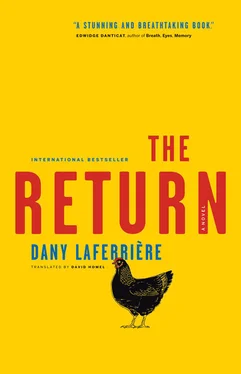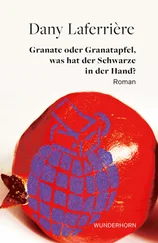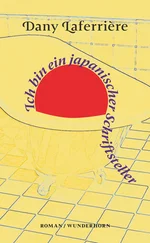I slip into the student café
on the corner of Ontario Street.
The waitress looks my way and doesn’t smile.
I sit at the back, by the radiator.
After a while she comes to take my order.
I can barely hear Arcade Fire.
A quick breakfast before heading to the station.
On the paper placemat I scribble down these quick notes (with little drawings between each scene) for song ideas as I sip my coffee.
SIDE A
Scene 1: I wander the streets with the key to my room in my pocket. I’m afraid of losing the key even as I savor the idea (close at hand) that everything I own at this very moment is in my pocket.
Scene 2: I meet a friend I knew in Port-au-Prince and he invites me to his place. His wife welcomes me with bedroom eyes and a smile that’s too sensual. I don’t stick around because I don’t play that game.
Scene 3: I go by the museum where the Modigliani show is on. I get in without paying. His life is no different from mine: frugal repasts, girls with long necks and cheap wine.
Scene 4: I’m sitting on a park bench, right across from the library. Right next to me two teenagers are kissing as a stunned squirrel looks on. The ducks are indifferent to the whole thing.
Scene 5: I’m making myself spaghetti with garlic sauce while keeping one eye on an old war film on my little black-and-white TV. It stars that German actress with the heavy hands — what is her name again?
Scene 6: From my window, I follow that girl in the summer dress (her legs and shoulders bare) all the way to her door. She turns around, feeling my eyes on the nape of her neck, then goes inside. Two days later, she is in my bathtub.
SIDE B
Scene 7: A well-dressed lady is walking in front of me on Laurier Street. She drops an earring. I try and tell her. She pays me no attention. I thrust the earring in her face. She grabs it out of my hand. And looks at me as if I had tried to steal her jewelry.
Scene 8: In a bar, people are talking about suicide. I’m always impressed by the courage it takes to choose death that way. The guy next to me says he’s already made two serious attempts, but he couldn’t stand a single day of exile. It’s the opposite for me. I don’t think I could survive suicide.
Scene 9: I’m in Repentigny, a small, well-off suburban town. Kids are dreaming of showing their paintings in a Montreal art gallery some day. I advise them to start by showing their work in their living rooms. They’re amazed they haven’t thought of that before. I come from a country where we’re used to making do with what we have.
Scene 10: A bunch of us are out together and the girl I’ve been sneaking looks at comes and kisses me. An endless kiss. Her boyfriend looks on with a smile. We haven’t drunk or smoked anything. Her kiss sets off a small explosion in my brain — which completely changes my view of relations between men and women. In Port-au-Prince, a look would have done the trick.
Scene 11: I go to a resource center for immigrant workers on Sherbrooke Street. If you’re really badly off, they’ll give you twenty dollars to get through the day. We talk politics and the guy wants to know in what circumstances I left the country, and whether I’d been tortured. The answer is no. He insists, because just getting slapped in the face would have been worth 120 dollars. The answer is still no. As I leave the office he slips me an envelope that I open outside, on the street. One hundred and twenty dollars. I feel like I’ve won the one-hundred meter dash without taking any drugs.
Scene 12: The old guy who lived upstairs from me, back when I was on Saint-Hubert. Whenever we crossed paths on the stairway, he made me follow him into his room so I could look at his photo album full of smiling faces. But no one ever came to see him, and I lived in that building two years.
Springtime Song: The first day you can go out without a winter coat on. I go down Saint-Denis. The sun on my skin.
Behind the Frosted Window
On that December afternoon I was just
a shadow behind the frosted window
admiring
one of nature’s most impressive spectacles.
Fascinated, I watched all that snow
endlessly falling.
The poet Émile Nelligan gained immortality
by using the word “snow” twice
in one very brief line:
“Oh, how the snow has snowed!”
Gilles Vigneault reached the same heights by singing
“My country is not a country, it’s winter.”
Here ice is the road to glory.
People of the North seem
so attracted by the sea
while ice frightens people of the South.
Is the seduction of hot weather enough
to explain why the first group
became colonizers much more easily
than the second?
No one saw it the way I did,
the snow falling
in fat gentle flakes.
I escaped the island
that seemed like a prison to me
and ended up encased
in a room in Montreal.
A short yellow dress slipping
through the cornfield
that dips down to the river.
I run behind my cousin.
The long summer vacation
still enchants my memory.
You can hear the song of the washerwomen
from the shack of that man
who lives off snail soup
and attends every funeral.
On my eyelids these images
burned by the sun of childhood.
Time moves at speeds so maddening
it has turned my life to a blur of colors.
That is how the polar night passes.
This sad gaiety always descends on me
at the same time.
When the car lights come on
and their beams sweep my room
and awaken my childhood terror.
I hide under the sheets.
The arrow makes
no noise in the night.
The pain visits
so suddenly
and will not depart
before dawn.
In the train.
Time softens.
We let ourselves be lulled.
I awake with a start
when in the night we cross
a phantom train.
The livid faces
make me feel
this train is arriving from 1944.
A nightmare flash created
by fulguration (speed and light)
and my foggy brain.
We’re in the middle of the countryside.
Pale glow lighting the houses.
I picture people gathered around the TV set.
The old man eating alone in his room.
The train won’t slow down until we reach
the next city.
Brightly lit towers. Shadows stretching along the sidewalks. And to think those robust trappers who once sold animal hides to the Hudson’s Bay Company have become elegant city-dwellers drenched in perfume. The smell of eau de cologne can’t quite mask the stubborn scent of the forest — an autumnal mixture of rain, green leaves and rotten wood. The vegetable world isn’t so far away. But yesterday’s backwoodsmen have become today’s captives, glued to the small screen.
I imagine it all happened gradually. A long series of concessions led us to this new way of living. It’s the same with individuals. The crowd absorbs us one by one. Today, at age fifty-six, I answer no to everything. I’ve needed more than half a century to recover the strength of character I had at the beginning. The strength of no. You have to keep at it. Stand behind your refusal. Hardly anything deserves a yes. Three or four things in a lifetime. Otherwise, answer no without hesitation.
The main thing in Protestant America is to make sure you never appear pretentious. Individually people want to slip through the cracks of life, but collectively they think they have a legitimate claim on the world. That kind of tension is not always bearable. Toward the end they can’t stand it anymore and start spitting up all the bile they’ve kept hidden in the heart of their being. A flow of black blood. Too late they realize there were no rules. No paradise. They have sacrificed for nothing. A life wasted. And someone has to pay. Someone weaker they can wail away on with all their might. But just when they think they’ve found the energy to live, it’s the end for them.
Читать дальше












